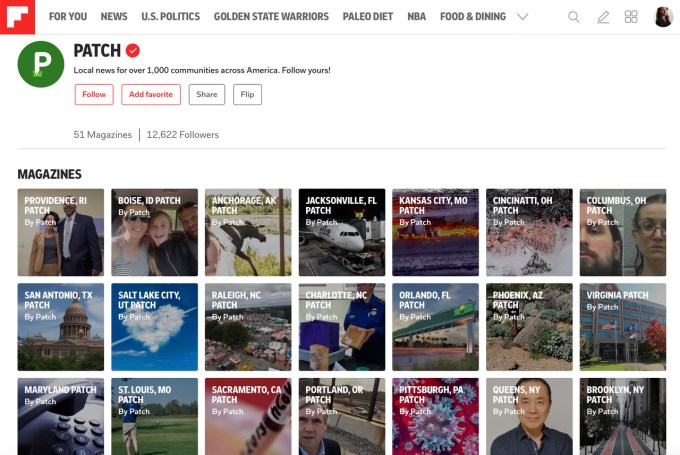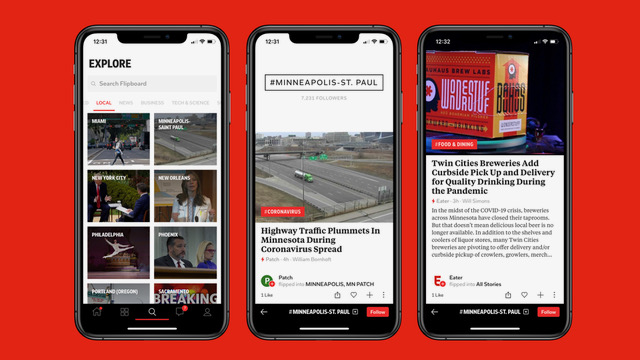News-reading app Flipboard expands local coverage, including coronavirus updates, to 12 more U.S. metros
Earlier this year, personalized news aggregation app Flipboard expanded into local news. The feature brought local news, sports, real estate, weather, transportation news and more to 23 cities across the U.S. Today, Flipboard is bringing local news to 12 more U.S. metros and is adding critical coronavirus local coverage to all of the 35 supported locales.
The 12 new metros include the following: Baltimore, Charlotte, Cleveland, Detroit, Indianapolis, Nashville, Pittsburgh, Orlando, Raleigh, Salt Lake City, St. Louis, and Tampa Bay.
They join the 23 cities that were already supported: Atlanta, Austin, Boston, Chicago, Dallas, Denver, Houston, Las Vegas, Los Angeles, Miami, Minneapolis-St. Paul, New Orleans, New York City, Philadelphia, Phoenix, Portland, Sacramento, San Diego, San Francisco Bay Area, Seattle, Toronto, Vancouver and Washington, D.C.
To offer local news in its app, Flipboard works with area partners, big and small, like The Plain Dealer’s Cleveland.com, the Detroit Free Press, and the St. Louis Post-Dispatch. It’s now added local news service Patch and ProPublica, including its Local Reporting Network partners and its collaborative journalism project Electionland, to the list of partners.
Patch alone is putting out over 200 local coronavirus stories per day. Meanwhile, the ProPublica Local Reporting Network funds and jointly publishes yearlong investigative projects with 23 local news organizations across the U.S. The Electionland initiative reports on problems that disenfranchise eligible voters like misinformation, changing voting laws and rules, voter harassment, equipment failures, and long lines at the polls.

To determine if a user should be shown local news, based on a user’s IP address — not a precise location — the app may recommend stories relevant to local audiences. It will also offer the Local sections inside the Explore tab in the Flipboard app. Once added, users can then browse their local news alongside other content they’re interested in, across a variety of topics.
At present, there are two main areas of interest to news readers — the COVID-19 outbreak and the 2020 Election, both of which are now offered in the local sections. In addition to understanding the current state of the pandemic on a global and national level, Flipboard readers in the supported areas will be able to track how the COVID-19 outbreak is impacting where they live. This could include coverage of things like local ordinances, school closings, shelter-in-place laws, number of cases and deaths, testing resources, and more.

“Understanding the decisions state and local governments make and their impact on the community is not only important, but gives people a greater connection to their local leaders and the media,” said Marci McCue, VP of Content and Communications at Flipboard. “For instance, as a local resident you may want coverage from national newspapers about the coronavirus outbreak, but even more importantly is a local source that tells you where you can get tested and measures local leaders are taking that impact your daily life,” she noted.
The addition of coronavirus special coverage at a local level, aggregated from across publishers, means readers will be able to track stories without having to hop around different sites or apps from area newspapers or broadcasters.
For Flipboard’s business, adding local news allows advertisers to target against user interests, which may now include a city’s metro region as one of those interests.
Flipboard’s mobile app today reaches 145 million users per month. Local news is available in the supported metros across both iOS and Android.
from TechCrunch https://ift.tt/2xp9jnx
via IFTTT

Comments
Post a Comment